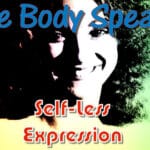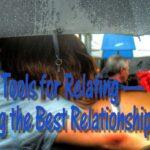“Have your emotions” is a Ben ‘n Jock-ism, and a common expression at The Haven. It is an interesting concept, and one that many people miss.
Emotions are experienced pretty much from birth, as anyone who has seen a red-faced infant screaming at the top of her lungs can attest. The infant’s emotion lacks meaning. It also “just happens.”
Let me try to explain how this works.

The chief aim of the first 14 years of life (or so) is socialization. This simply means that the tribe and culture of the child teaches the child what things mean.
Let me hasten to add that this is not about what is ‘true.’ This is about what the tribe holds to be legitimate.
Thus, some groups think ‘a’ is acceptable, while another group adamantly rejects ‘a.’
Emotions arrive unbidden. Infants / children experience them without the filters later applied to them. Soon, the tribal ‘take’ on each emotional state is force fed to the child.
“Big boys don’t cry.”
“Sugar and spice and everything nice…”
“What have you to be angry about?” or “I’ll give you something to be angry about.”
“If you keep pouting your face will freeze that way.”
You may think that this is unimportant, but I can guarantee that you have a whole list of internal and not-thought-through ‘rules’ about emotions.
Some emotions, (happy, giggly, content, perhaps moody – what most people would think of as the ‘positive’ emotions) are considered ‘expressible’ in most circumstances. Anger, grief, and emotions thought to be ‘negative’ almost always come with proscriptions against their expression.
Let me be clear: I am not making ‘socialization by tribe’ a bad thing. It’s required. Otherwise, we’d all be laying around screaming and pooping our diapers. (Like the orange TACO.) I’m simply suggesting that emotional expressing comes with baggage, and the baggage is all about repressing the ‘bad’ ones while demanding the ‘good’ ones.
I often encouraged my clients to act out their anger by smacking their bed or couch, while yelling in colourful language. I also encouraged my clients to make noise during Bodywork.

This can be quite disconcerting for many of them. They report hearing mom’s or dad’s voice, letting them know that expressions of anger or sadness or grief is definitely not OK.
The reason it’s “not OK” is that such emotions made mom and dad uncomfortable, so they did what they could to get their kid to repress and distrust noisy emotions.
And they were uncomfortable because of what their parents told them, and on and on.
All adults have a built-in critiquing system regarding both their emotions and the emotions of others.
It’s interesting to watch people seeing Bodywork for the first time, when it’s done in a group. The person receiving may, for example, start shouting and pounding the mat. Some people physically back up. Others get pale and look stricken.
The vocal ones demand that the recipient stop yelling, either from an “I can’t stand that” perspective, or from a more new-agey, lame, “That is violating my personal space.” The message is the same: I have no tolerance for the negative emotions of others.
I repeat, we have learned this behaviour at the knees of our tribes. To which I respond, “So what?”
Emotions need to be expressed. Period.
Safely, cleanly, and under some time constraint, but expressed none-the-less. Stuffing emotions does no good—from a Bodywork perspective, all that happens is that the blocked emotions finds another way out.
The article title suggests the concept of responsible behaviour. When I taught this approach to clients, the first thing I worked toward convincing them of was the idea that emotions are things one has.
Emotions are not caused by externals.
So, no one ‘makes’ me angry (or anything else.) People do whatever they do, and I anger myself (or sadden myself, or amuse myself…)
Once you get this, you can do the responsible thing, and ‘own’ your anger. From there, you can choose to safely and cleanly express it.
To do so, you will have to recognize that your upbringing will have taught you to stuff this expression, so you ’ll have to ‘do it anyway.’
The other part of being responsible is ‘aiming’ the emotion at an inanimate object. I therefore do not yell at Darbella, for example. I invite her to be a witness as I yell at a chair, a tree (we used to own property—I’d stand naked in the hot tub and yell at the trees in the woods—a sight to behold!).
Perhaps I may also want to pound a heavy bag or the bed, or the seat of a chair.
The idea is to ‘have’ the emotion. Not justify the emotion, explain the emotion or blame someone for the emotion.
Have it. Express it. Move through the emotion.
Back to people in groups watching this work. In almost all cases, one time of seeing someone get really angry at a chair or a pad, and seeing that the sky did not fall, is enough to convince the observer that expressing anger in this way is safe and OK.
This applies, of course, to all emotions. When sad, one cries. When in need of support, one asks for a hug.
All of the problems with emotions go away when I accept responsibility for my emotions. They are mine, I create them, and I ask for space to express them.
Look at what you are stuffing, repressing, and denying as far as your emotions go. Have a chat with your nearest and dearest, and work out a mutual “have your emotions” pact. Find responsible, honest ways to own and express your emotions.
Your body, mind, and spirit will thank you!






